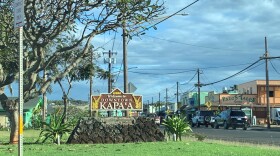When Diana Spruill became homeless in August 2022, she had Section 8 vouchers and two extensions, but she still couldn't find a place for herself and her daughter.
While working two jobs on Kauaʻi's east side, she lived in her car so her daughter could still attend Kapaʻa Elementary School.
"We would spend most of our nights at Lydgate Park, (which is the) best place to take a shower every morning since they have inside showers," she said Thursday. "Being homeless means no kitchen, so even though I had food stamps, I spent a lot eating out because I had nowhere to cook."
Spruill was on the Kauaʻi Economic Opportunity emergency shelter list.
"Every week I would go there and check to see where we were on the list," she said. "I would leave crying all the time."
The day she got the call, she moved in. "It was the first time in a long time I could give my daughter a warm shower," Spruill said.
Spruill and her daughter are one of more than 36,000 people the state's Office of Community Services and its partners helped in fiscal year 2022. This could include transitional housing, workforce development and childcare.
The Community Services Block Grant program provides federal funds for many of Hawaiʻi's wrap-around services. Last year, the state received just under $4 million and is now in the process of applying for new money.
Robert Piper, executive director of the Honolulu Community Action Program, said success has to do with prevention and case management.
"We're trying to do a more holistic approach, if you will, from the start when somebody is referred to us to the end when they leave us," Piper said. "Then we do wrap-around servicing as best as we can."
Community action agencies include Hawaiʻi County Economic Opportunity Council, HCAP, Maui Economic Opportunity and KEO.
The Office of Community Services has submitted its newly proposed 2-year plan, which must be approved by the U.S. Department of Human Services.
As of May, Spruill and her daughter live in public housing, and she works as KEO's transitional housing coordinator.
"I feel that I know how to navigate our clients through the process," she said.






